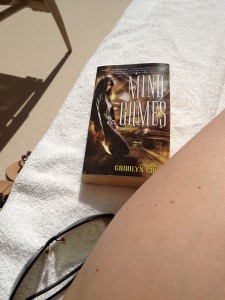 I’ve been reading a lot of books lately that I wouldn’t normally pick up.
I’ve been reading a lot of books lately that I wouldn’t normally pick up.
That’s because I’m judging for the Romance Writers of America (RWA) RITA awards. This is the romance genre’s version of the Hugo or the Oscar. Yeah, there might be some out there already snorting in disdain, but for our genre, this is one of the highest awards you can get. The first round is entirely peer-judged. As in, if you want to enter your book for the RITA, then you must judge. Thus, in mid-January, I received eight novels to read by the beginning of March.
We do get to pick categories, but otherwise I am reading books by authors I have never read before. All of them are a bit of a stretch from my normal pleasure reading. We’re asked to judge the book entirely on its quality and not whether or not we enjoy that particular kind of story, which is also a different lens.
It’s been interesting. And I’m over halfway through my pile, amazingly enough.
One of them is a new author discovery for me now. I gave her book a perfect score and look forward to reading more. Another, in a sub-genre I rarely read, I ranked very high. I don’t know that I’ll pick up her books again, for myself, but I could recognize how well she executed her craft.
One book, though written decently, failed as a romance, in my opinion. Oh, she had all the plot points in there. She faithfully followed the tropes, but they continued to feel empty to me. Contrived, even, which romance is so frequently accused of being.
So, here’s where I make a leap into a series of assumptions. I’m theorizing and obviously have no hard data to back up my ideas here.
It’s no secret that the romance genre is making big bucks these days. A fact that seems to seriously annoy all those who consider romance not worthwhile. Latest stats from RWA: $1.36 billion in sales each year, the largest share of the consumer-book market, more than a quarter of all books sold are romance. What writer doesn’t want some of that pie?
More and more, I’m seeing writers of other genres coming over to the romance field, to pump up their sales. Or adding touches of romance, in order to sell it on that shelf. And sure, sometimes this is the work of the publisher or marketing department, trying to slide in under that umbrella.
The thing is, it’s difficult to wield a trope you don’t love. See, a trope is like a cliché or an archetype. They can be powerful devices or cardboard dummies. A good romance embraces the full emotionalism of people coming together, with all the silliness, hearts, flowers, flying cupids, spats, passion, grand gestures and breathless, intimate moments that implies. It’s not easy to write clichés in a new, vivid and heartfelt way. But if a writer doesn’t tap into that deep store of energy that fuels the tropes in our hearts and minds, then all of that becomes cliché in the worst possible sense.
All of us romance readers love to giggle at the tropes. There are great blogs out there that encourage these discussions. We laugh at the impossibly virginal, feisty heroine and the alpha-male hero who also cooks and loves to brush her hair. And yet, when it’s done right, we also sigh in dreamy delight, and follow their story with fervent attention.
Why? Because the author takes the tropes and breathes life into them.
That doesn’t happen if the author, deep-down, doesn’t respect the tropes.
We might poke fun at the tropes like we roll our eyes at our husbands not being able to find anything without us, but if someone else makes out like our husbands are worthless? Oh no no no.
Use the power of the trope, young author.
But beware of taking it lightly.
 A shot from poolside in Las Vegas last weekend. I finally finished my RITA duties (eight novels in eight weeks – oy) and got to read this book. Wow, did I enjoy it. Fascinating new world. Like Anne McCaffrey’s psychics, only grittier.
A shot from poolside in Las Vegas last weekend. I finally finished my RITA duties (eight novels in eight weeks – oy) and got to read this book. Wow, did I enjoy it. Fascinating new world. Like Anne McCaffrey’s psychics, only grittier.
